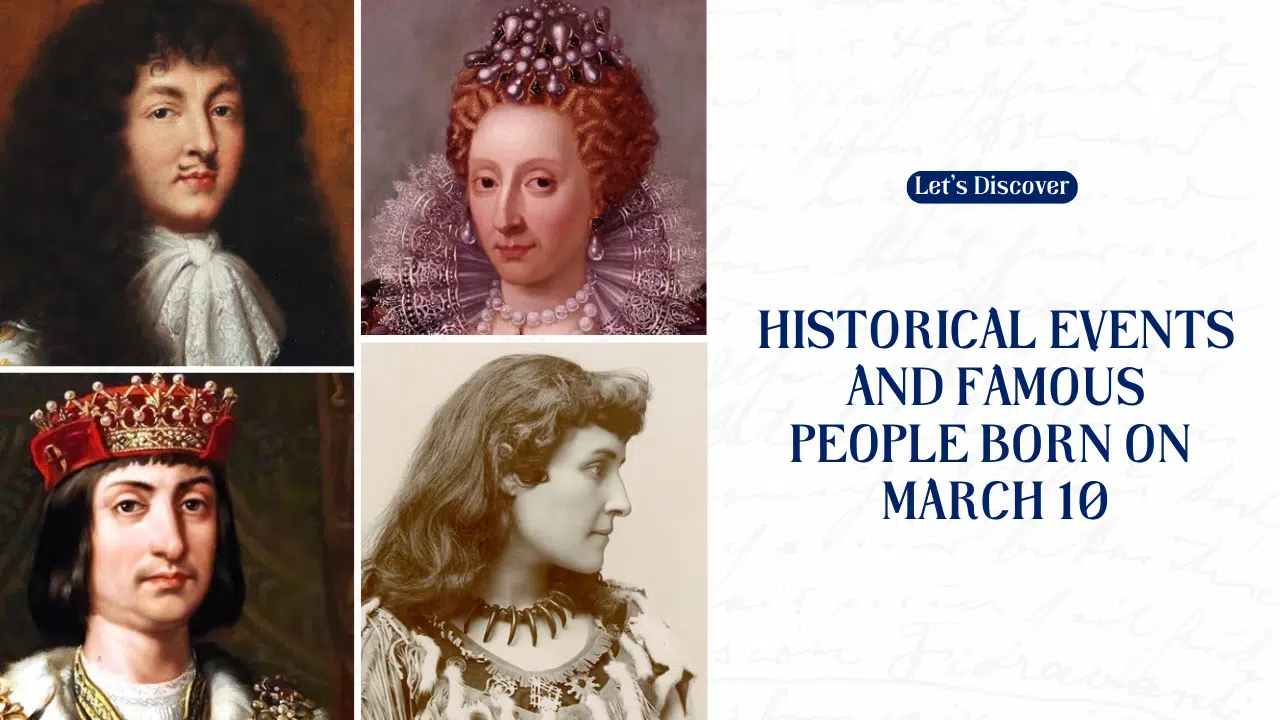March 10 is rich in historical events and notable individuals who were born on this day. People often search for significant moments from the past or notable figures who share their birthday.
On March 10, 1876, Alexander Graham Bell made history with the first successful telephone call. This fact alone shows the range of impactful moments March 10 has witnessed.
Our blog post will guide you through the fascinating historical events and famous people born on March 10. We cover kings and cosmonauts, inventions that changed how we communicate, and much more.
Get ready to explore a date rich in history and birthdays.
Famous People Born on March 10
Many significant figures share March 10 as their birthday. From pioneering leaders to talented artists, this date boasts a diverse array of influential individuals.
Ferdinand II of Aragon
Ferdinand II of Aragon played a vital role in Spain’s history. He was born on March 10, 1452. Along with his wife Isabella I, he united Spain through their marriage. This union helped establish the foundations for modern Spain.
Ferdinand became known as one of the Catholic Monarchs.
His reign saw significant events like the Spanish Inquisition and Columbus’s voyage to America in 1492. Ferdinand sought religious unity in Spain during this time, often leading to harsh measures against Jews and Muslims.
His actions shaped the future of Spain and influenced many historical milestones that followed.
Akechi Mitsuhide
Akechi Mitsuhide, born on March 10, 1527, played a crucial role in Japan’s history. He became famous as a samurai and general during the Sengoku period. Mitsuhide served under Oda Nobunaga, one of the most powerful leaders of that time.
Their alliance helped unify Japan after years of conflict.
On June 21, 1582, Akechi betrayed Nobunaga during the Incident at Honnō-ji. This dramatic turn led to Nobunaga’s death and changed Japan’s power structure forever. After taking control for only a short while, Mitsuhide faced his own downfall.
The historical events surrounding him highlight significant moments in Japanese history that shaped the future of the nation. His actions continue to spark interest among historians and fans alike who discover more about this notable individual born on March 10.
Kate Sheppard
Kate Sheppard, born on March 10, 1847, became a leading figure in New Zealand’s suffrage movement. Her efforts helped women gain the right to vote in 1893, making New Zealand the first self-governing country to grant this right.
She played a critical role in organizing petitions and meetings that rallied support for women’s rights.
Her work continues to inspire many around the world today. Sheppard’s legacy lives on as one of the most notable individuals in history for her tireless advocacy. Significant figures like Carrie Underwood also share this birth date with her.
Pauline Johnson
Pauline Johnson, a renowned poet and storyteller, was born on March 10, 1861. She gained fame for her unique blend of Indigenous themes and English poetry. Johnson often shared stories reflecting her Mohawk heritage.
Her work highlighted the beauty of Indigenous culture during a time of great change.
She performed her poetry across Canada and the United States. Audiences admired her powerful presence and captivating words. Pauline became an important figure in Canadian literature, inspiring future generations.
Today, people remember her contributions on this special date in history as we discover famous birthdays like hers on March 10.
Lillian Wald
Lillian Wald, born on March 10, 1867, became a key figure in American social reform. She founded the Henry Street Settlement in New York City to assist immigrants and the poor. Her work focused on providing healthcare, education, and housing support.
Lillian advocated for children’s rights and played a role in establishing nursing services.
As a leader in the push for social justice, she championed public health initiatives. Through her efforts, she influenced legislation related to labor and health conditions. Many recognize her contributions as vital steps towards improving living standards for many communities.
Hans Luther
Hans Luther was born on March 10, 1483. He played a vital role in the Reformation as a prominent German theologian and reformer. His life intersected with significant historical events.
He faced intense opposition from the Catholic Church due to his beliefs.
This reformer influenced many people during his time and beyond. His actions helped lay the groundwork for religious tolerance in Europe, an important theme of that era. Through his teachings, he sparked discussions about faith that resonate to this day.
Hans Luther’s legacy lives on as one of the most influential figures in history, helping shape modern Christianity and encouraging others to seek their own paths toward understanding faith.
James Earl Ray
James Earl Ray was born on March 10, 1928. He became infamous for assassinating Dr. Martin Luther King Jr. in 1968. This act shocked the nation and ignited widespread protests against racial injustice.
Ray’s actions changed the course of history and highlighted deep societal issues.
Ray’s life took many turns before this event. His early years included multiple jobs and run-ins with the law. After committing his crime, he fled and traveled across several states, evading capture for weeks.
Law enforcement eventually apprehended him in London at a temporary airport in 1968, leading to his return to the U.S., where he faced trial and received a 99-year prison sentence.
This biography marks James Earl Ray as one of the infamous figures born on March 10 amid various historical events that shaped society today.
Sepp Blatter
Sepp Blatter, born on March 10, 1936, served as the FIFA president from 1998 to 2015. Under his leadership, FIFA faced both growth and controversy. Many fans remember him for expanding the World Cup and promoting soccer around the globe.
Blatter became a central figure in various scandals related to corruption within FIFA. His tenure drew attention for alleged mismanagement and ethical issues. Despite these challenges, he remains a notable name in sports history.
Fans still discuss his impact on international soccer and football governance today.
Chuck Norris
Chuck Norris, born on March 10, 1940, gained fame as an American martial artist and actor. He became a pop culture icon through action films and television shows. Many know him for his role in the TV series *Walker, Texas Ranger*.
His tough-guy image helped him become a household name.
Norris also inspired countless memes highlighting his supposed superhuman abilities. Aside from acting, he holds black belts in multiple martial arts disciplines. The world celebrates Chuck Norris not just for his skills but also for entertaining fans around the globe.
On this day, we remember such influential birthdays in history, like his, together with other famous figures.
Kim Campbell
Kim Campbell was born on March 10, 1947. She made history as Canada’s first female prime minister. Serving from June 1993 to November 1993, she led the Progressive Conservative Party during a challenging time in Canadian politics.
Campbell focused on issues like constitutional reform and economic challenges.
Before her political career, Kim earned her law degree and worked as a lawyer and educator. After leaving office, she remained active in politics and public speaking. She has received numerous awards for her contributions to social justice and women’s rights.
Her legacy continues to inspire future leaders born on March 10, along with other famous individuals throughout history.
Osama bin Laden
Osama bin Laden, born on March 10, 1957, became a notorious figure in world history. He founded al-Qaeda and played a key role in the September 11 attacks in 2001. This act of terrorism changed global security measures forever.
Bin Laden was originally from Saudi Arabia but later lived in Afghanistan.
His actions sparked intense military responses from multiple countries. In 2011, U.S. forces located and killed him in Pakistan. His life story shows how one person can influence major historical events dramatically.
The impact of his actions still resonates today as societies reflect on issues of terrorism and peacekeeping efforts worldwide.
Sharon Stone
Sharon Stone was born on March 10, 1958. She gained fame as an actress and producer. Stone starred in popular films like “Basic Instinct” and “Casino.” Her performances earned her critical acclaim and several award nominations.
Beyond acting, she is known for her humanitarian work. Stone advocates for causes related to health care and human rights. She continues to inspire audiences with her talent and charitable efforts.
Discover the impact of famous people born on March 10, like Sharon Stone, who shaped history in various ways.
Prince Edward
Prince Edward, born on March 10, 1924, belongs to the British royal family. He is the youngest child of King George V and Queen Mary. Throughout his life, he has taken part in various charitable activities.
Prince Edward served in the Royal Navy as well. His commitment to public service remains strong.
March 10 carries historical weight too. It marks important events such as Alexander Graham Bell’s first successful telephone call in 1876 and Yuri Gagarin’s birth in 1934. Many significant occurrences happened on this date throughout history, making it special for those who share it with famous figures like Prince Edward.
Historical Events on March 10
Historical events on March 10 shaped the course of history in various ways. Many key moments occurred, revealing the struggles and achievements of different societies.
Dutch Rebellion
The Dutch Rebellion began in the late 16th century. It marked a fight against Spanish rule and led to the independence of the Netherlands. This conflict evolved into an important historical event on March 10.
The struggle spanned several decades, with many notable battles.
On March 10, significant moments occurred during this rebellion. Key leaders emerged, each playing crucial roles in various confrontations. The rebellion influenced future events around Europe as ideas of freedom spread.
Ultimately, it shaped the course of Dutch history and inspired other nations to seek their own independence from oppressive regimes.
Charles I Dissolves Parliament
Charles I dissolved Parliament on March 10, 1629. He believed he could govern without their support. This action marked a significant moment in English history. Charles wanted to impose his own rules and taxes.
His decision created tensions between the monarchy and Parliament.
Years later, those tensions led to the English Civil War. People across England grew unhappy with Charles’s rule. They felt he ignored their rights as subjects of the crown. His actions pushed many to question royal authority and demand change in governance.
Louis XIV’s Personal Rule
Louis XIV ruled France from 1661 to 1715. He became known for his personal rule. This period marked a shift in how monarchs governed their countries. Louis took control and made decisions without consulting advisors or ministers.
His reign focused on centralizing power in the monarchy.
During this time, he also managed numerous wars and expanded French territory. His government pursued religious tolerance, promoting peace between Catholics and Protestants. The lavish court life at Versailles showcased the wealth of France but placed heavy demands on the country’s resources.
As a result, Louis XIV’s personal rule greatly influenced European politics and set standards for future rulers, including those born on March 10, like Kate Sheppard and Chuck Norris.
Voltaire’s Struggle for Religious Tolerance
Voltaire fought hard for religious tolerance in the 18th century. His efforts came during a time when different faiths often clashed. He criticized intolerance through his writings and actions.
Voltaire believed that everyone should enjoy freedom of belief. His philosophy influenced many thinkers after him.
On March 10, he stood against dogma and promoted reason instead. His views laid the groundwork for modern ideas about tolerance and freedom of expression. People today still refer to his work as they advocate for similar rights.
Bell’s 1st Telephone Call
On March 10, 1876, Alexander Graham Bell made history with the first successful telephone call. He spoke to his assistant, Thomas Watson, who stood in another room. Bell said, “Mr.
Watson, come here; I want you.” This simple phrase marked a giant leap in communication technology. His invention changed how people connected over long distances.
Bell’s work set the stage for modern telephony. The success of this call helped pave the way for future innovations. Over time, telephones became common in homes and businesses across America and beyond.
Now, with smartphones everywhere, we can see just how far Bell’s breakthrough has taken us.
Sullivan vs Mitchell
Sullivan vs. Mitchell marked an important legal case in American history. This case involved a lawsuit regarding the wrongful death of a man named Sullivan. The courts had to determine whether Mitchell was liable for Sullivan’s death, which stirred public interest.
In 1906, the jury found in favor of Sullivan’s estate. They awarded significant damages to his family. This decision set a precedent for future cases related to negligence and liability.
Such rulings shaped how courts interpret accountability under the law, especially concerning wrongful deaths. Events like this remind us of the power and influence of legal decisions on society’s views about justice and compensation.
Movie Camera not Invented by Edison
Edison did not invent the movie camera. Instead, a different inventor developed this groundbreaking technology. The arrival of the motion picture began with the work of Louis Le Prince in 1888.
He created a film using his unique device, which captured moving images on paper strips.
Later, Thomas Edison entered the scene with his own innovations. His team built the Kinetoscope in 1891, allowing individuals to view short films by peering through a viewer. This invention sparked interest and laid the groundwork for future filmmakers.
Celebrated works emerged from this period as cinema started to take off.
Sonatine
Sonatine,” a film directed by director and actor Takeshi Kitano, debuted in 1983. It tells the story of a young Yakuza member who goes on the run after a botched job. As he seeks refuge, he finds a place to reflect on his life.
The film features stunning visuals paired with quiet moments that capture deep emotions. “Sonatine” explores themes of violence and redemption while showing Kitano’s unique cinematic style.
Audiences appreciate its blend of action and introspection. This landmark movie remains influential in Japanese cinema history alongside famous birthdays like Chuck Norris, born on March 10, 1940.
Malone Scores 6
On March 10, 1995, basketball player Karl Malone had a standout performance. He scored 6 points in the late moments of a game against the New Jersey Nets. This pivotal moment helped his team secure a victory.
Malone’s skill and determination on the court made him one of the most recognized players in NBA history. His achievements contribute to why fans celebrate March 10 as an important date in sports history.
Famous figures also share this special day. Among them are Chuck Norris and Carrie Underwood, both born on March 10. Each year, people remember their achievements alongside historical events tied to this date.
Discovering these connections can deepen understanding of significance tied to March 10 through various lenses—sports, entertainment, or history itself.
1st Flight Over Mt Demawend
The first flight over Mt. Demawend took place on March 10, 1913. This historic event marked a significant achievement in aviation history. The aircraft soared above the majestic peak of Iran’s highest mountain, standing at about 18,600 feet.
Pilots showcased their skills while navigating the challenging terrain.
This milestone contributed to the advancement of flight technology and exploration. As aviators pushed boundaries, they inspired future generations to pursue aviation careers. Discovering new heights became a symbol of human ambition and tenacity in our quest for knowledge and discovery on important dates like this one.
Events of Interest on March 10
March 10 saw the King of Swing making headlines with his memorable performances. Meanwhile, the Academy Awards celebrated cinematic achievements in a star-studded event that left audiences buzzing.
King of Swing
The “King of Swing” refers to Benny Goodman, a legendary jazz musician. He rose to fame in the 1930s and helped popularize swing music. Goodman’s big band played lively tunes and captivated audiences across America.
His famous concert at Carnegie Hall in 1938 marked a turning point for jazz.
On March 10, 1940, another influential figure born on this date, Chuck Norris, also made an impact on American culture as a martial artist and actor. His tough persona won over fans in films and television shows.
Both men shaped their respective fields during significant times in history.
Jezebel
Jezebel represents a significant cultural figure in history. Her tale begins in the Bible, where she is known for her strong will and defiance. She married King Ahab of Israel and promoted the worship of Baal, leading to conflict with the prophet Elijah.
Jezebel’s actions left a lasting impression on literature and popular culture.
In March 10’s historical context, filmmakers have used her story for inspiration. The 1938 film “Jezebel” starred Bette Davis, showcasing her as a powerful woman who challenged societal norms.
This portrayal resonates with audiences even today. Discovering such figures like Jezebel allows us to understand how women’s roles evolved through time.
10th Academy Awards
The 10th Academy Awards took place on March 10, 1938. This event celebrated outstanding achievements in film. It highlighted the best movies and performances from the previous year.
The ceremony took place at the Biltmore Hotel in Los Angeles.
“One Hundred Men and a Girl” won Best Picture that night. Several talented individuals received awards for their remarkable work. These honors recognized both actors and filmmakers who impacted cinema greatly.
Many viewers tuned in to see who would take home trophies during this exciting show of talent and creativity.
Firebombing of Tokyo
On March 10, 1945, American forces initiated the firebombing of Tokyo during World War II. This raid aimed to destroy Japan’s industrial capabilities and weaken its war effort. Bombers dropped incendiary bombs over the city, igniting massive fires.
The flames spread rapidly due to wooden buildings and narrow streets.
The intense attack resulted in devastating destruction. Over 100,000 civilians lost their lives that night alone. Firebombing reduced large parts of Tokyo to ruins and left countless residents homeless.
This event marked a significant moment in military history and illustrated the war’s brutality against civilian populations.
Kesselring Succeeds Rundstedt
Kesselring took command of German forces on March 10, 1945, after Rundstedt’s dismissal. This change came during World War II as Germany faced significant challenges. Kesselring had experience in aerial warfare and land battles.
His leadership aimed to strengthen Germany’s position against the advancing Allies.
The shift marked a turning point in strategies employed by the Germans. As Allied forces pushed closer into their territory, Kesselring adjusted tactics to delay further losses. Many factors contributed to the war’s outcome, but this event highlighted the struggle for control over Europe during that time.
The pressure on Germany intensified with each passing day as they fought to hold their ground amidst rising opposition from many countries involved in the conflict.
3rd Army and 1st Army Make Contact
On March 10, 1945, the U.S. Army’s 3rd Army made contact with the 1st Army during World War II. This significant event occurred near the town of Remagen in Germany. The two armies joined forces to launch a stronger attack against German troops.
Through their combined efforts, they aimed to push deeper into enemy territory. Their collaboration marked a crucial moment in the advance toward Berlin. As both armies fought together, they improved their chances of success and hastened the defeat of Nazi forces.
Historical events like this highlight teamwork in battles throughout history as nations strive for victory against oppressive regimes like those seen under Adolf Hitler’s rule.
Hoover Declines Post
Herbert Hoover, the 31st President of the United States, declined an important post on March 10, 1933. He rejected an offer to serve as the Secretary of State under President Franklin D.
Roosevelt. This decision came soon after Adolf Hitler became chancellor in Germany. Hoover’s choice signaled his distance from FDR’s New Deal policies.
Hoover faced criticism during his presidency for his handling of the Great Depression. As time went on, he prioritized personal principles over political power. His stance reflected a commitment to integrity despite immense pressure during challenging times.
Cuban Coup d’état
The Cuban coup d’état took place on March 10, 1952. This event changed the government in Cuba dramatically. Fulgencio Batista led a military coup that overthrew the existing government of President Carlos Prío Socarrás.
Batista claimed he wanted to restore order and stability to Cuba. His actions shocked many citizens, who had believed in democratic processes.
Batista’s regime faced significant opposition from various groups, including Fidel Castro’s revolutionary movement. The coups cast a long shadow over Cuba’s future and shaped its political landscape for years to come.
The turmoil influenced historical events in Latin America as well. Discovering such moments shows how March 10 has played an important role through history, reflecting changes brought by famous figures and significant conflicts alike.
Takeaways
March 10 is a date rich with historical significance and remarkable individuals who have shaped the world. From groundbreaking inventions like Alexander Graham Bell’s first telephone call to pivotal political events such as the Cuban coup d’état, this day has witnessed moments that changed history. It is also the birth date of influential figures, including Ferdinand II of Aragon, Kate Sheppard, Chuck Norris, and Sharon Stone, whose contributions span politics, activism, entertainment, and sports.
Exploring historical events and famous birthdays on March 10 provides a deeper understanding of the past and its impact on the present. These stories remind us of the power of innovation, leadership, and perseverance in shaping societies and inspiring future generations.
FAQs on Historical Events And Famous People Born On March 10
1. What can I discover about March 10 on the Gregorian calendar?
On the Gregorian calendar, you can uncover historical events that happened and famous people who were born on March 10.
2. Are there any significant events that occurred on March 10 in leap years?
Yes, during leap years, many notable historical events have taken place on March 10 according to the Gregorian calendar.
3. Who are some famous people born on March 10?
There are numerous well-known individuals born on March 10 as per the Gregorian calendar; however, specific names would require more detailed research.
4. How does discovering historical events and famous birthdays help us understand our past?
Uncovering historical happenings and recognizing those born on a particular day, like March 10, provides insight into our shared history and societal development over time.




































